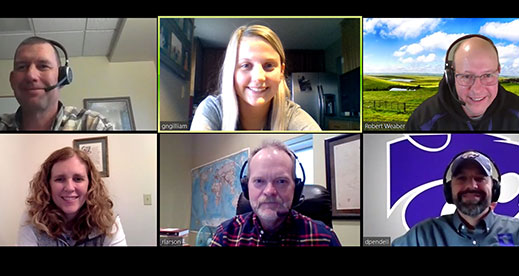
Beef Cattle Institute team members work on the BCI Cattle Chat podcast remotely in response to the current safe distance restrictions. Pictured clockwise from top left are Brad White, Gabyrelle Gilliam, Bob Weaber, Dustin Pendell, Bob Larson and Lisa Moser. | Download this photo.
Beef cattle experts discuss business management strategies during a crisis
Weekly podcast offers tips on how to keep the business moving forward
April 7, 2020
MANHATTAN, Kan. – The world is changing at a rapid pace because of the required response to the global human health crisis. Online communication has a whole new meaning for many.
Those connected with the beef supply chain — from cow-calf producers to stocker operators, feedlot managers, packers, retailers and food service providers — are making varying degrees of adjustments to continue providing a consistent, safe food supply for consumers in a time of crisis.
The Kansas State University Beef Cattle Institute team of experts joined with Matt Teagarden, chief executive officer of the Kansas Livestock Association, on a weekly podcast to discuss ways cattle producers are adapting to state and national restrictions related to COVID-19 and how to keep agricultural businesses moving forward.
“We’ve made sure throughout this process that agriculture has been deemed an essential business,” Teagarden said. “From calving cows to moving cattle through the system for harvest for conversion to beef…those are critical to securing the food supply.”
Teagarden said communication is one of the key components to working through a crisis.
“With our K-State purebred unit, the manager and I are in continual communication so we can make good, strategic decisions for the unit,” said Bob Weaber, faculty coordinator for the university’s purebred beef unit and beef extension specialist.
As part of the internal communication plan, it is important to set and communicate the goals and expectations clearly with employees.
“You’ve got to let everyone on the team know what their role will be moving forward and then let them do their job,” said Dustin Pendell, K-State agricultural economist.
Teagarden added it is especially important to leverage the strengths of everyone during a time of crisis.
“It is important to involve the entire team in the response by giving each person a specific role, from the person answering the phone to the one providing service to the members. It is a whole team effort,” he said. “Involving everyone is valuable because it makes the response effort more effective and it’s good for the team.”
It offers employees a positive way to impact a tough situation, said K-State veterinarian Brad White.
As the plan changes, it is important to communicate with external audiences as well. Veterinarian Bob Larson cites the example of a beef cattle veterinarian.
“Clients need to know what services veterinarians are continuing to provide and how some of the routine work may be implemented a little differently,” he said.
As beef producers work with their veterinarians and employees to adapt their business plan and manage the crisis, Larson stressed the importance of continuing to focus on operational goals.
“Even though we are dealing with a crisis, you need to continue to follow your long-term business plan,” Larson said.
The group also offered a summary checklist on ways to manage a business through crisis, including:
- Set and manage expectations for your employees.
- Determine your goals and make them clear to the team.
- Embrace the power of positivity.
- Develop and execute an external communications plan.
- Actively communicate with your internal team.
- Involve the entire team in addressing the issue.
- Keep your long-term vision in mind when creating your crisis plan.
To listen to this podcast, search for BCI Cattle Chat wherever podcasts are found, or visit https://ksubci.org/media/podcast-2/.

